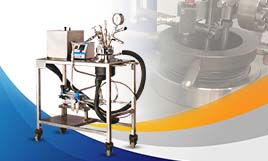Different Types of Impact Testing Systems
Impact testing is one of the materials testing methods that is used for the measurement of the material’s impact toughness. Impact testers are materials testing systems designed to determine the toughness and ability of the material to absorb energy caused in case of sudden loading.
The results obtained from impact testing systems are essential for understanding the material’s applications for future use. After going through the impact testing method, the materials are then checked for any signs of fracture, deformation and rupture.
There are different types of impact testing systems available. Some of the popular systems that are used for impact testing are discussed in this blog. Keep on reading till the end to find out about them.
Charpy Impact Test
The Charpy impact test, which is also referred to as the Charpy V-notch test, is a high strain-rate test. It involves hitting a standard notched specimen material with a regulated weight pendulum swung from a determined height.
The type of impact test helps measuring the amount of energy absorbed by the specimen material during fracture. The results from Charpy tests show whether a material can be classified as either brittle or ductile.
This impact test type is particularly useful for ferritic steels that display a transition from ductile to brittle with decreasing temperature. A brittle material tends to absorb a small amount of energy upon impact testing whereas a tough ductile material absorbs a large amount of energy.
Additionally, the fractured surface’s appearance delivers the information about the type of fracture that has occurred. If the fracture is brittle then it appears to be bright and crystalline. On the contrary, a ductile fracture is dull and fibrous.
IZOD Impact Test
The IZOD impact testing method is suitable for notched and unnotched sample material where the sample is vertically positioned. The primary purpose of this test method is to investigate the behavior of plastic/composite materials under the specified impact conditions.
The IZOD test also enables the estimated brittleness or toughness of the sample material, taking into account the limitations within the test conditions. The type of impact testing is ideal for a diverse range of materials. This may include rigid fiber-reinforced composite (unidirectional or non-unidirectional), thermoplastic molding/ extrusion materials (filled and unfilled) and thermotropic liquid-crystal polymers etc.
Generally, an IZOD Impact Tester comprises a pendulum type hammer with a mount to clamp the sample material into position and also a striker. As the pendulum strikes the specimen, the breaking energy of the specimen is recorded.
Conclusion
If you are in search for a versatile range of impact testing systems then check out BCL offered Impact Tester systems. These impact testers conform to global standards as ISO 148-1 & ASTM E23.
For any further information, you can reach out to BCL at info@bcluae.com.








